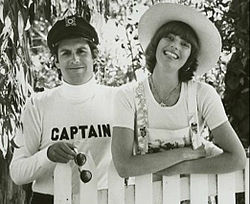
RPM was a Canadian music magazine that published the best-performing singles chart in Canada from 1964 to 2000. In 1975, thirty-two singles reached number one in Canada. The first number one single was "Kung Fu Fighting" by the Jamaican singer Carl Douglas which reached number one in December 1974, and the last was "That's the Way (I Like It)" by the American disco and funk band KC and the Sunshine Band. Twelve acts had their first number-one on the chart, such as Barry Manilow, the Eagles, Carol Douglas, Labelle, Captain & Tennille, Michael Murphey, Pilot, Van McCoy, 10cc, KC and the Sunshine Band, The Amazing Rhythm Aces, and Johnny Wakelin. Two Canadian acts, Paul Anka and Bachman-Turner Overdrive, had at least one number-one song each in the chart that year.
Contents
The best-performing single of the year was "Love Will Keep Us Together", originally written and performed by Neil Sedaka and recorded by the American pop duo Captain & Tennille; it spent 18 weeks in the chart, including a week at number one. Elton John had the most weeks at number one in 1975, totalling six weeks with a 4-week number-one run with a cover version of the Beatles' "Lucy in the Sky with Diamonds" and two weeks with "Philadelphia Freedom". KC and the Sunshine Band had a total of four weeks at number one with "Get Down Tonight" (one week) and "That's the Way (I Like It)" (3 weeks). Barry Manilow, Olivia Newton-John and John Denver spent a total of three weeks each at number one, and several other acts spent a total of two weeks at number one, such the Eagles, Paul Anka, Ringo Starr, Bachman–Turner Overdrive, Van McCoy and 10cc.



